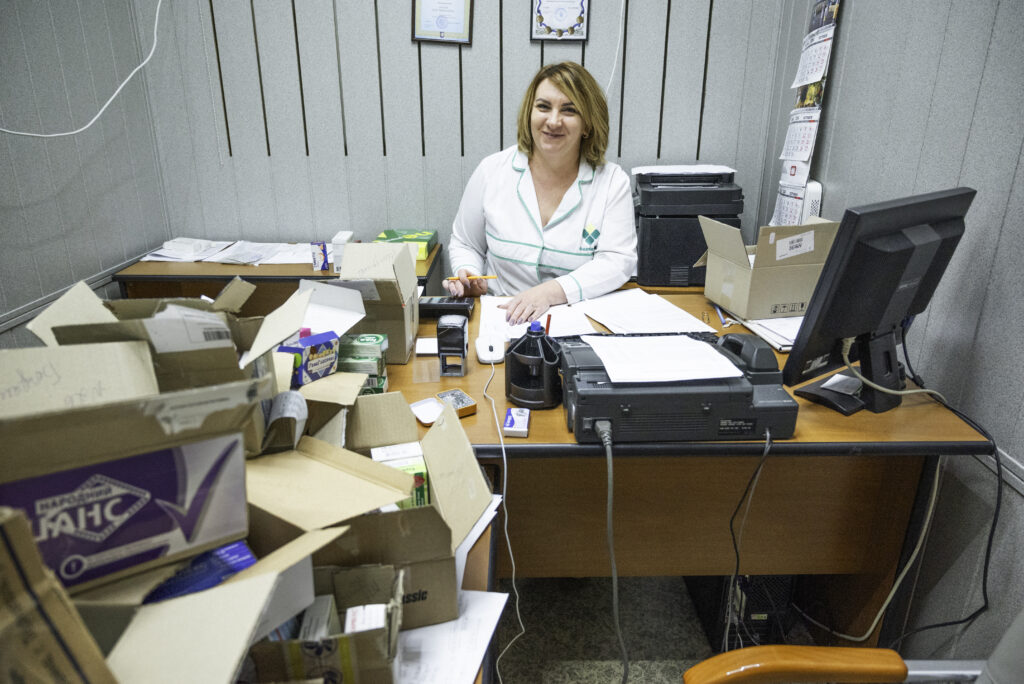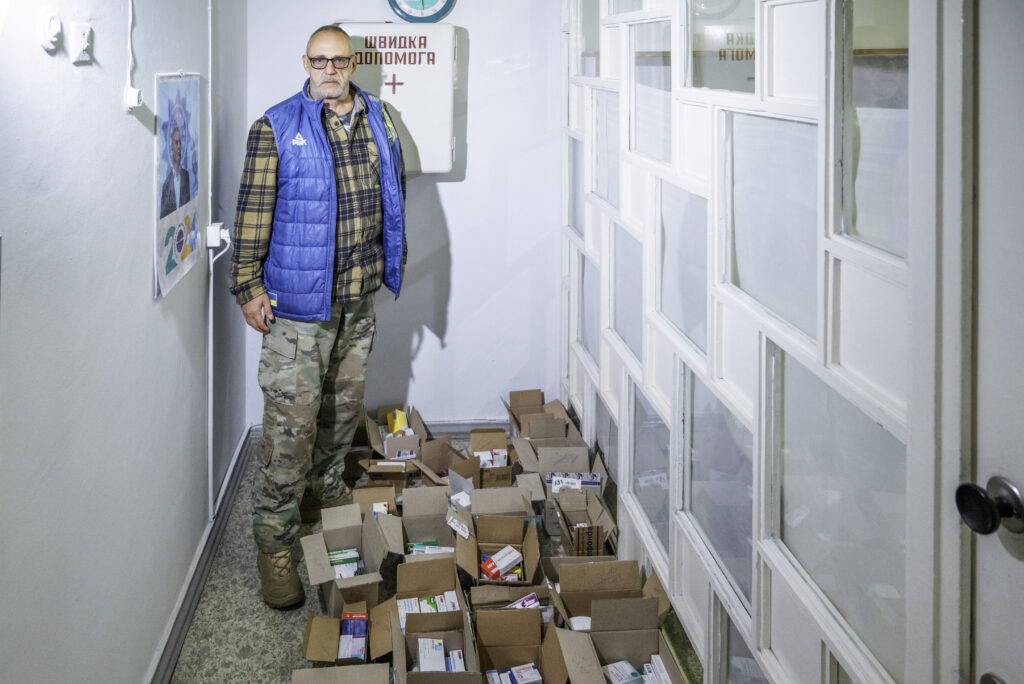
A CSO that has been funded by the BEARR Ukraine Appeal
With the onset of Russia’s full-scale invasion of Ukraine, volunteer initiatives have become a distinct phenomenon and one of the primary driving forces in addressing the needs of both the armed forces and the civilian population directly affected by the consequences of war.
BEARR supporter Dana Verstak visited DobroMitzvah and tells the story here:
Oleksii, co-founder of the DobroMitzvah charitable foundation, alongside what he calls their “women’s battalion” – Iryna, Tetiana, and Liudmyla – decided to establish the organisation in August 2022. Their aim was to formalise the financial streams of volunteer aid they had been involved with since the start of the invasion.
I arrange to meet Oleksii over the phone. He has just returned from another volunteer trip to Kharkiv (a major city near the frontline in eastern Ukraine). We agree to meet at a pharmacy collaborating with the foundation, where they purchase medicine to be sent to people in frontline villages with no access to essential medications.
It’s a sunny morning on 18 October in Kyiv. Oleksii greets me on the pharmacy steps with a cigarette in hand, wearing a flannel checkered shirt, glasses, and a blue vest from the Olympics, bearing a yellow “Ukraine” inscription on the back. We exchange greetings before he leads me inside and introduces me to Lesia and Olga – pharmacy staff who assist Oleksii in sorting medicines and handling documentation.

From left to right: Olha – a pharmacist, Lesia – the pharmacy director, and Oleksii – the co-founder of DobroMitzvah.
Lesia, with her warm smile and short blonde hair, dressed in a pharmacist’s white coat, gives me a tour of the production areas of one of Kyiv’s once-largest pharmacies. In the past, it not only sold medications but also manufactured and mixed prescriptions. I feel excited, having never ventured into the labyrinth of a large pharmacy from the other side of the counter. Lesia and Oleksii guide me to a small corridor filled with boxes of sorted medicines soon to be dispatched to the East. Beyond the corridor lies a small office with two desks and a computer, where Lesia stamps documents for the sorted medications. At another desk, Oleksii is packing boxes, cross-checking handwritten lists of names and medications.
He seals the boxes with tape bearing the logo of the RememberUS organisation. I learn about them as I ask Oleksii my first question:
– Can you tell me how your collaboration with the BEARR Trust began?
Oleksii: The BEARR Trust was in contact with our partner organisation RememberUs in the US, founded by our colleagues and friends Igor and Julia Korsunsky. The British foundation, however, was seeking Ukrainian organisations to work with directly, and since DobroMitzvah operates as a trusted partner of RememberUs, they recommended us to the BEARR Trust.
– But your project existed before receiving grant support from the BEARR Trust. What were you working on?
Oleksii: That’s correct. From the beginning of the invasion, we supported large families, pensioners, and people with disabilities. We used to send around 600 parcels a month, totalling about 6000 kg of food and hygiene items.
– How do you determine what aid to provide and what to purchase?
Oleksii: We focus on needs. We gather information, conduct surveys, analyse questionnaires, and establish the most urgent demands for the coming months. Then we approve programmes. Right now, it’s medications, but it’s not always or exclusively that. For instance, leading up to 1st September, we often organise support for several schools near the frontline, helping with food and stationery for students. We also assist displaced families who are forced to enrol their children in new schools – a significant stressor for both adults and kids. Soon, we’ll focus on St Nicholas Day (6 December, traditionally marked in Ukraine by leaving gifts for children under their pillows) and Christmas. Our goal is to ensure that vulnerable children in orphanages and large families under our care receive presents.
Oleksii emphasises that as a small organisation, DobroMitzvah prioritises regular assistance over one-off efforts, as consistency allows for better budget planning – a crucial factor in times of uncertainty.
Oleksii: We can sense that Europe and the US are growing tired of helping, – Oleksii notes, – with the ongoing conflict in the Middle East, the focus on Ukraine has significantly shifted over the past year. Every dollar is hard-won, and consistent donor support allows us to plan certain expenses in advance, – he gestures towards the boxes, – like these medications, for example.
DobroMitzvah’s monthly budget ranges from $10,000 to $16,000, allocated to address critical needs such as portable stoves for heating homes (particularly vital due to frequent electricity outages and disruptions to central heating, especially in areas near the frontline), essential medicines, baby food, and more.
– How do people find out about your initiative and what assistance they can request?
Oleksii: Instantly! – he exclaims with a laugh. – Instantly! We have a website and a Facebook page. As soon as we announce an application window, we receive up to 300 requests within a few days. Many people are already subscribed and follow our updates. Word of mouth works brilliantly as well – people share information with relatives, neighbours, and acquaintances.
We have specific selection criteria. For instance, the current medication project is aimed at individuals over 70. Average pensions don’t allow these people to afford the medicine they need. We filter out requests unrelated to pharmaceuticals – for example, we don’t purchase dietary supplements. Instead, we procure specific medications based on need. Our goal is to deliver medicines directly to the individuals who require them.
– What challenges do you face in your work?
Oleksii: The first and most obvious challenge is fundraising, – Oleksii stresses again. The next challenge is defining objectives over a specific period, distinguishing between simple wishes and urgent needs. One of our principles is that our aid is delivered directly. We avoid humanitarian warehouses to prevent fraud. Hence, we have filters for application submissions. The hardest part is identifying immediate needs. We engage with people, analyse the context. Our “women’s battalion” personally calls and speaks with every applicant. It’s extensive analytical work.
For example, solar-powered street lamps for villages beyond 20 km from the frontline (due to light-masking requirements within 20 km). These areas face severe power outages, especially in winter. Light provides comfort, – Oleksii’s tone softens, – it’s kindness. It’s these small things that add a touch of humanity. A solar lamp isn’t an essential item, but it brings comfort, and that’s a kind gesture.
– What, in your opinion, has been your biggest success?
Oleksii: Everything has been successful, – Oleksii replies confidently, without false modesty. His tone conveys pride and a sense of competence without arrogance. – In over two years and two months, we haven’t received a single complaint or negative feedback on social media. We follow clear rules, operate within defined frameworks, and maintain structure – this helps us move forward step by step.
We also have a very interesting long-term initiative: we purchase vegetable seeds (cucumbers, peppers, tomatoes) and distribute them to farmers in distressed villages. In return, we ask them to share part of their harvest with us. We buy rice, spices, and jars for canning, and volunteer groups from these regions make preserves – full salads with rice. So far, we’ve produced about 6,000 jars. These are then delivered to military hospitals and to civilians in combat zones.
Oleksii takes out his phone and shows me photos of soldiers posing with jars of preserves, followed by images of village residents to whom he personally delivers stoves.
– This woman saw the stove, – he recalls, – and was so happy. She said, “What a wonderful stove! I’ve always dreamed of one like this! And the pipe is just perfect!” – She tried to thank us by offering us porridge and cutlets.
We laugh warmly as we look through the photos.
– Is there something particularly difficult you’ve overcome that you’re proud of? – I ask as our conversation draws to a close.
Oleksii: Visiting liberated territories is emotionally very hard. Other than that, I’m a manager at heart. The most challenging task for me is structuring a project. Another important role DobroMitzvah plays is helping our international partners better understand the local context. It’s all teamwork, – he remarks, just as he finishes packing and sealing another box, while Lesia completes stamping the accompanying documents.


I offer to help carry the boxes, and we load them into a volunteer minivan parked in the pharmacy’s backyard. Oleksii shows me small keepsakes crafted and gifted to him by soldiers from the frontlines, which he carries as keyring charms.
The van is a vibrant, cheerful yellow with large “VOLUNTEERS” lettering on the front and sides. While taking a few photos of Oleksii in front of the van I ask one final question:
– How did you come up with the name DobroMitzvah?
Oleksii: “Dobro” means kindness in Ukrainian, and “Mitzvah” means a good deed in Hebrew. When we combined them and put it into Google Translate, it translated as “charity.” – Oleksii smiles, – We liked it.